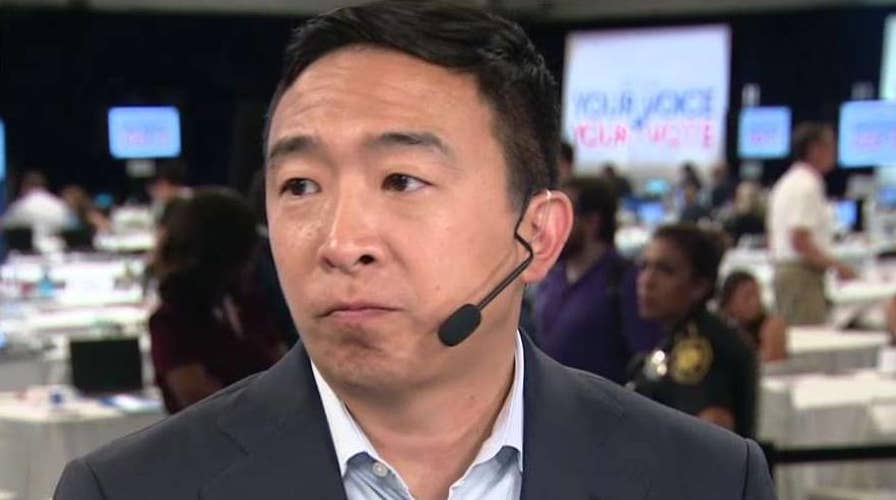Andrew Yang on whether promising 10 random families $12,000 each violates campaign finance laws
Democratic presidential candidate Andrew Yang joins Bret Baier on 'Fox News @ Night' to discuss his debate performance, universal income proposal.
Democratic presidential candidate Andrew Yang set himself apart from the primary field by proposing what many consider a radical idea, a Universal Basic Income (UBI) of $1,000 per month to be paid by the government to every citizen.
Conservatives hate it. Liberals love it. But there is a way that such a government grant could make sense for those on both sides of the political spectrum. UBI could work if it were simultaneously coupled with the near elimination of the present welfare system.
OK, so you want a minimum income given to you via a government check. But here’s the deal. No more bogus disability claims; no more year after year food stamps; no more Obama phones, or most other supplemental benefits.
JUSTIN HASKINS: BIPARTISAN DEFICIT DISASTER — TRUMP, GOP SHARE BLAME WITH DEMOCRATS FOR FISCAL MESS
Many forget that the idea was first floated by a Republican, President Richard Nixon, in his first term. It got little traction and for good reason. There was no linkage to eliminating a welfare program that was exploding at the time.
A far more conservative context was laid out by author Peter Cove in his book "Poor No More." Cove was a one-time liberal who was part of the welfare establishment. Over time, he soured on the giveaway bureaucracy that he felt was stifling the potential of lower-class individuals to rise up the economic ladder. He eventually worked with President Bill Clinton on welfare reform.
CLICK HERE TO SIGN UP FOR OUR OPINION NEWSLETTER
“I propose we eliminate all welfare programs,” suggested Cove. “From 1964 until today we have spent over $19 trillion on such programs and have hardly moved the poverty rate down from 17 percent in 1964 to 14.5 percent in 2014. We should wipe the slate clean, take all the money saved and create jobs.”
At first blush, it might make hard-working folks recoil that anyone sitting on his duff would get a check. But isn’t it the complaint of many conservatives that this is what’s happening now, anyway?
More from Opinion
Nothing provides a stronger incentive than a “Don’t work, don’t eat” policy. That’s not what we have in America today. Clinton’s workfare reforms have been watered down considerably. The present policy says if you don’t work, you can still get a check for food, but if you supplement that check with earnings, you will lose part, or all, of that free stuff.
The difference is the new system that guarantees income but eliminates welfare would no longer discourage recipients to earn an extra buck on the fear that it would wipe out their Medicaid, food stamps and other social service benefits. Once you get your minimum salary, anything you make above that is all gravy. It’s still cheaper for the U.S. taxpayer because the mammoth welfare bureaucracy will be a thing of the past.
Some will still stay on their couches while they collect the check. But most will be incentivized to get work, full- or part-time. This can only add productivity to the workforce.
Democrats have monopolized votes by promising free stuff. The catch is that it has relegated generations to be stuck in poverty since earning over a certain amount of money causes you to lose your benefits.
Moreover, this plan could possibly keep families together, rather than tearing them apart. Ironically, it was the policies of white liberals that precipitated the disintegration of the African American two-parent family through the bizarre incentives do-gooder politicians incorporated into the welfare system. Have more children, get more money. Live apart from your spouse, get more money. Think about how many more children might have fathers back in their lives because there will no longer be a monetary incentive to live apart.
For 50 years the Democratic Party has had a lock on the African-American vote. They’ve done so primarily by demonizing white Republicans as being racist toward African-Americans.
They’ve also monopolized votes by promising free stuff. The catch is that it has relegated generations to be stuck in poverty since earning over a certain amount of money causes you to lose your benefits.
This was borne out in an anecdotal situation told to me by a friend who runs a company on Long Island. The company hired a young lady off of welfare. She performed well and was offered a raise, after which the company received a phone call from the employee’s social worker, demanding it be rescinded. When the flabbergasted company agent asked why, she responded that the employee would lose much of her government-provided assistance.
Rejecting the raise preserved that young woman’s present benefits, but it was it a death knell for her dreams of upward mobility. She would forever be stuck in a low-wage dead-end, while maintaining her dependence on government, and, more particularly, the Democratic Party.
CLICK HERE TO GET THE FOX NEWS APP
Little does Yang realize, but his idea may one day be the way poor people can break free of the Democratic Party’s stranglehold that has eviscerated hope for economic advancement.
Standing alone, Yang‘s proposal may seem nuts. But if we were to tie it to the near elimination of the welfare system, it could be a godsend for the nation's economy and for those who have been trapped in a cycle of poverty for generations. This idea deserves more thought.









































